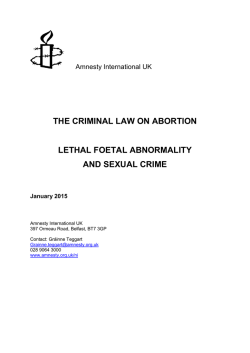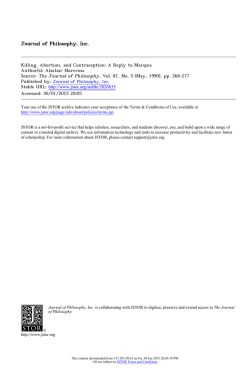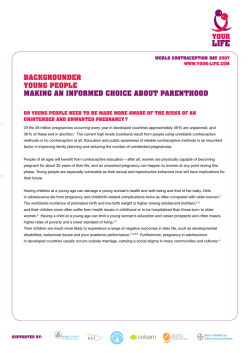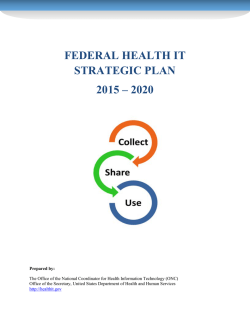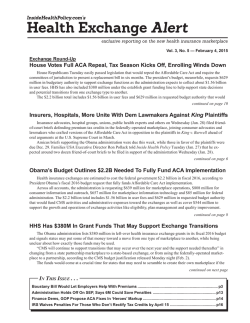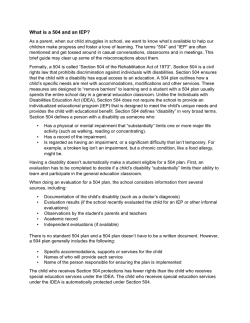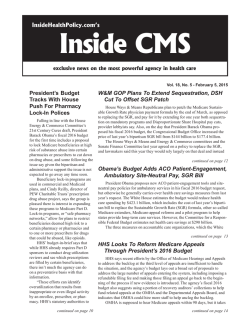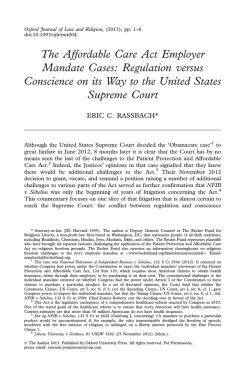
The Health Care and Conscience Debate
THE HEALTH CARE AND CONSCIENCE DEBATE, 12 Engage: J. Federalist Soc'y... 12 Engage: J. Federalist Soc'y Prac. Groups 121 Engage: The Journal of the Federalist Society's Practice Groups June 2011 Religious Liberty THE HEALTH CARE AND CONSCIENCE DEBATE Luke W. Goodrich a1 Copyright © 2011 The Federalist Society for Law & Public Policy Studies; Luke W. Goodrich Can a hospital require a nurse to assist in an abortion in violation of her religious beliefs? Can a university require one of its researchers to participate in embryonic stem cell research? Can a pharmacy fire one of its pharmacists for conscientiously refusing to dispense the morning-after pill? In the waning days of the Bush Administration, the Department of Health and Human Services (HHS) weighed in on these questions by issuing a regulation designed to protect health care workers' right of conscience. Pro-choice groups cried foul, asserting that the regulation exceeded the bounds of federal law; several states challenged the regulation in federal court; and the Obama Administration proposed rescinding it. On February 23, 2011, the Administration made good on that proposal, rescinding most of the Bush regulation and replacing it with a new one. This article does three things. First, it explains how the new regulation affects protections for conscience. Second, it outlines and responds to the principal arguments against broad conscience protections. Finally, it highlights where the next big fights over conscience will occur--in courts, state governments, the executive branch, and Congress. Ultimately, although the new regulation narrows protections for conscience, federal and state laws continue to uphold the principle that no health care worker be forced out of the profession solely because of his or her religious beliefs. I. What Does the New HHS Regulation Do? Both the Bush and Obama regulations center on three federal laws protecting health care workers' right of conscience--the Church Amendments, 1 the Public Health Services Act, 2 and the Weldon Amendment. 3 This section briefly summarizes these laws, describes the tug-of-war over their implementing regulations, and explains how the new regulation narrows protections for conscience. A. Statutory Protections for Conscience Federal laws provide a wide variety of protections for health care workers' right of conscience. The first Church Amendment, enacted in 1973, protects against government pressure to participate in a sterilization or abortion. Specifically, it provides that the receipt of federal funds cannot be used as a reason by the government to require any health care entities--whether doctors, nurses, hospitals, or others--to participate in sterilization or abortion if doing so would be “contrary to [their] religious beliefs or moral convictions.” 4 Other Church Amendments protect not only against government pressure to violate conscience, but also against private pressure. For example, certain recipients of federal funds, such as hospitals, cannot penalize employees who conscientiously refuse to perform a sterilization or abortion. 5 Similarly, medical schools, universities, and other institutions are prohibited © 2014 Thomson Reuters. No claim to original U.S. Government Works. 1 THE HEALTH CARE AND CONSCIENCE DEBATE, 12 Engage: J. Federalist Soc'y... from discriminating against applicants for medical school, internships, or residencies because of their conscientious refusal to participate in sterilization or abortion. 6 Other amendments extend conscience protections beyond participation in sterilization or abortion. Specifically, these amendments prohibit the recipients of certain federal research funds from penalizing employees who conscientiously refuse to participate in “any lawful health service or research activity.” 7 They also broadly provide that “[n]o individual” can be required in violation of their conscience to participate in “any part of a health service program or research activity” funded by HHS. 8 Thus, for example, a research institution working on a grant from HHS cannot penalize one of its employees for refusing to engage in embryonic stem cell research. The Public Health Services Act (also known as the Coats-Snowe Amendment), passed in 1996, further limits federal, state, and local governments from penalizing individuals and institutions that refuse to participate in abortions, abortion training, or abortion referrals. 9 It also protects physician training programs from losing their accreditation for refusing to participate in abortions. 10 Finally, the Weldon Amendment, incorporated in every HHS appropriations act since 2005, protects not only health care practitioners and institutions, but also HMOs and insurance plans that object to paying for abortions. It provides that no HHS funds may be made available to federal, state, or local agencies if those agencies discriminate against any entity (including doctors, hospitals, insurance companies, or HMOs) that refuses to provide, pay for, cover, or refer for abortions. 11 Importantly, none of these federal laws includes an enforcement mechanism or private right of action. Thus, a doctor, nurse, or hospital that suffers a violation of these conscience protections cannot sue in federal court. 12 Only a federal agency (like HHS) can enforce these laws. B. The Bush Regulation The Bush regulation was prompted by concerns about hostility toward health care workers' right of conscience and widespread ignorance of the relevant federal restrictions. 13 Finalized in December 2008, 14 the regulation did three things. First, it provided detailed definitions of key statutory terms. For example, the Church Amendments generally protect conscientious objections to “assist[ing] in the performance” of various health procedures, without defining what “assisting” means. 15 The regulations defined “assist in the performance” as “to participate in any activity with a reasonable connection *122 to a procedure, ... includ[ing] counseling, referral, training, and other arrangements for the procedure ....” 16 According to HHS, these definitions were offered to “clarif[y] the scope of [conscience] protections” and “ensure proper enforcement.” 17 Opponents of the regulation argued that the definitions unduly broadened protections for conscience and exceeded the bounds of the statute. Second, in order to raise awareness of the relevant federal laws, the regulation required certain recipients and subrecipients of HHS funds to certify in writing that they would comply with federal conscience protections. 18 Recipients of HHS funds already must certify that they comply with other federal nondiscrimination laws, such as Title VI and Title VII. 19 HHS added a certification for conscience protections because of the “lack of knowledge on the part of States, local governments, and the health care industry” about those protections, and because “[c]ertification provides a demonstrable way of ensuring that the recipients of [HHS] funding know of, and attest that they will comply with, the applicable [conscience] provisions.” 20 Opponents argued that the certification requirement was unnecessary and burdensome. Third, the regulation designated the HHS Office for Civil Rights (OCR) to receive complaints about the violation of the conscience protections and to coordinate enforcement actions. 21 In the past, no regulation explained how the conscience © 2014 Thomson Reuters. No claim to original U.S. Government Works. 2 THE HEALTH CARE AND CONSCIENCE DEBATE, 12 Engage: J. Federalist Soc'y... protections would be enforced, and no particular body within HHS was responsible for handling complaints. Instead, individual program officers were responsible for ensuring compliance with the federal conscience laws--along with thousands of other laws and regulations that may have been applicable to any given grant or contract. Thus, those who suffered violations of the conscience laws had no designated authority to report to; and those responsible for enforcing the laws may or may not have been aware of their existence. The regulation remedied that by designating a particular office to receive complaints and coordinate enforcement. This aspect of the regulation was probably the least controversial. C. The Obama Regulation Pro-choice groups criticized the Bush regulation, claiming it was an unnecessary and unlawful expansion of conscience laws and would harm women's health. Seven left-leaning states challenged the regulation in federal court, alleging that it exceeded HHS's statutory authority and violated the Administrative Procedure Act. 22 Shortly after President Obama took office, HHS proposed rescinding it in its entirety. 23 Two years later, on February 23, 2011, HHS issued a final regulation rescinding most of the Bush regulation. Specifically, the new rule eliminates all of the definitions from the Bush regulation and eliminates the requirement that recipients of HHS funds certify that they will comply with those laws. The only element of the Bush regulation that remains is the designation of OCR to receive and coordinate complaints. By eliminating the Bush-era definitions, the new regulation effectively narrows protections for conscientious objectors and creates significant uncertainty. Take, for example, the question of whether a doctor is protected from discipline for conscientiously declining to provide an abortion referral. Under the Bush regulation, the answer was clearly yes. The key statutory term-- “assist in the performance” 24 --was defined to include “counseling, referral, training, and other arrangements for the procedure.” 25 But under the Obama regulation, the answer is unclear. According to the commentary on the new regulation, “[t]he Department is not formulating new definitions because it believes that individual investigations will provide the best means of answering questions about the application of the statutes in particular circumstances.” 26 In other words, conscience claims will now be resolved by HHS officials on a case-by-case basis. This creates uncertainty not only for abortion referrals, but for many other widespread claims of conscience. Perhaps the most important are claims by pharmacists who have conscientious objections to dispensing drugs they believe to be abortifacients (such as the morning-after pill or Ella One). Under the Bush regulation, pharmacists were expressly protected as “health care professional[s].” 27 Under the Obama regulation, their status is unclear. Indeed, neither the regulation nor HHS's commentary ever mention pharmacists. The commentary states only that “[t]here is no indication that the federal health care provider conscience statutes intended that the term ‘abortion’ included contraception” 28 --suggesting that the regulation may narrow the conscience protections of some pharmacists who object to dispensing potential abortifacients. In sum, the Obama regulation significantly narrows protections for conscience, while leaving the remaining protections largely at the discretion of HHS officials. II. How Does the New HHS Regulation Fit into the Larger Debate over Health Care and Conscience? The new regulation is important not only for its practical effects, but also for how it exemplifies the larger national debate over health care and conscience. Opponents of the Bush regulation--and opponents of conscience protections generally--typically offer three primary objections to conscience protections for health care workers: (1) conscience protections impede access to health care; (2) conscience protections promote discrimination; and (3) conscientious objectors should find other employment. The first two were expressly relied on in HHS's commentary on the new regulation. And because all three frequently recur in the broader debate over health care and conscience, they are worth a closer look. © 2014 Thomson Reuters. No claim to original U.S. Government Works. 3 THE HEALTH CARE AND CONSCIENCE DEBATE, 12 Engage: J. Federalist Soc'y... A. Access to Health Care Perhaps the most common objection is that conscience protections will limit women's access to health care. This argument was relied on heavily in the Obama regulation, with HHS expressing concerns that broad conscience protections “had the potential to negatively impact patient access to contraception and certain other medical services.” 29 According to this argument, lowincome women or women in rural areas may find it difficult to obtain an abortion or time-sensitive contraception if health care workers exercise the right of conscience. 30 This argument is rarely backed by empirical evidence demonstrating that conscience protections undermine access to health care or harm women's health. Conscience protections *123 have been on the state and federal books for almost forty years. If they limit access to health care, there should be abundant evidence of that fact. Yet such evidence has not been forthcoming. An example of this lack of evidence is the current debate in Washington State over the rights of pharmacists who conscientiously object to dispensing the morning-after pill. In response to pro-choice lobbying efforts, Washington issued a regulation in 2006 requiring all pharmacies to dispense the morning-after pill. The regulation has been embroiled in litigation ever since. 31 Despite years of factfinding during rulemaking and discovery, and despite a concerted canvassing effort by Planned Parenthood, it was undisputed in the factual record of the litigation that pro-choice groups were unable to find a single example of a patient in Washington who was denied the morning-after pill for reasons of conscience and was unable to timely obtain the drug elsewhere. 32 This result is not surprising given how widely available the morning-after pill is. It is available not only at pharmacies, but also at physicians' offices, government health centers, hospital emergency rooms, and via a toll-free hotline. It is available at Planned Parenthood's network of nearly one thousand centers across the country, many of which are in rural and impoverished areas. And it is available from online drugstores with overnight home delivery. The fact that a small fraction of pharmacies or pharmacists may decline to dispense the drug for reasons of conscience does not mean the drug is inaccessible. If there are any problems of access, they could be solved without narrowing conscience protections. California, for example, requires any facility or clinic that conscientiously objects to providing abortions to “post a notice of that proscription in an area of the facility or clinic that is open to patients and prospective admittees.” 33 Similarly, Illinois requires pharmacies that do not carry emergency contraception to post a sign directing patients to other pharmacies that do. 34 Such information-forcing rules are less intrusive than requiring pharmacies and individual pharmacists to stock and dispense religiously objectionable drugs, while still ensuring that patients are able to promptly find the treatment they desire. 35 Opponents of conscientious objection often reject these compromise measures. Again, the lawsuit over the rights of pharmacists in Washington is illustrative. There, the pharmacy at issue in the lawsuit is located in Olympia, Washington, within five miles of over thirty pharmacies that stock and dispense Plan B. 36 It willingly refers patients to those pharmacies for the morningafter pill, just as it refers patients elsewhere when any other drug is out of stock. Yet the state Attorney General and pro-choice litigants have rejected any compromise that would allow conscientious objectors to make immediate, consciencebased referrals. The access argument is also based on the subtle assumption that most conscientious objectors are just bluffing. According to critics, conscientious objectors don't really care about their religious beliefs enough to maintain them in the face of opposition; rather, faced with the choice between participating in an objectionable procedure and being punished, most health care practitioners will simply cave in and participate. That is not the case. Many, if not most, health care workers will resign rather than violate their sincerely held religious beliefs. Some have already been forced to do so. 37 Others will refrain from entering a profession where their sincerely held religious © 2014 Thomson Reuters. No claim to original U.S. Government Works. 4 THE HEALTH CARE AND CONSCIENCE DEBATE, 12 Engage: J. Federalist Soc'y... beliefs are not respected. Thus, pressuring doctors, nurses, and pharmacists to violate their consciences will not increase access to health care for anyone; it will instead drive qualified individuals away from the profession, thus reducing access to health care for everyone who is not seeking abortion or contraception. B. Discrimination Opponents of conscience protections also sometimes argue that those protections will allow health care workers to engage in discrimination. According to this argument, conscientious objectors will not just decline to participate in abortion or dispense contraceptives, but will refuse to serve entire classes of people--such as homosexuals seeking HIV medication, or single mothers seeking contraception--solely because they find their conduct morally objectionable. This argument, too, figured prominently in HHS's commentary to the Obama regulation. 38 Evidence of conscientious objections based on “discrimination” is even harder to come by than evidence of objections that impede access. In the Washington pharmacy controversy, for example, opponents of conscience protections repeatedly argued that conscientious objectors would engage in discriminatory, “personal” refusals to dispense a drug. Yet after years of rulemaking and discovery, they were unable to produce a single real-world example. 39 The overwhelming majority of conscientious objectors care about a handful of readily identifiable procedures--abortion, contraception, embryonic stem cell research, and assisted suicide. Also, any objections based on discriminatory animus would generally be unprotected by existing conscience clauses or prohibited under antidiscrimination laws. For example, many conscience clauses protect only religious objections to specific procedures, such as participating in sterilization or abortion or dispensing contraceptives or lethal drugs. They do not extend to HIV medications or other medicines, devices, or procedures. 40 Other conscience clauses expressly provide that they do not cover refusals based on things like “race, color, religion, sex, age, disability or national origin.” 41 Moreover, even the broadest conscience protections are by definition limited to religious or moral beliefs that are “sincere”-- that is, beliefs that are truly rooted in conscience. 42 If a health care worker tries to use conscience protections as a pretext for discriminatory animus, the protections do not apply. Nor do conscience protections automatically render antidiscrimination laws inapplicable. While conscience protections may protect individual health care workers, a worker's employer would likely still be covered by applicable state, federal, and local antidiscrimination laws, such as those requiring equal access to public accommodations and health services. 43 C. Get Another Job Many opponents of conscience protections reject the notion of conscience protections, arguing that conscientious *124 objectors should “get another job.” According to this argument, if a pharmacist does not want to dispense the morning-after pill, he should not become a pharmacist. 44 Some go further, arguing that conscientious objection is “an intolerable abuse of power,” 45 unethical, or “wrong.” 46 Despite often being wrapped in language of “choice” and “toleration,” this argument is discriminatory: It would exclude a significant portion of the general population from an occupation solely because of their religious or moral beliefs. Such discrimination would never be acceptable on the basis of race, gender, or national origin. Of course, if a health care practitioner desires to specialize in an area where he or she objects to the vast majority of the work (not a likely scenario), such a desire need not be accommodated. But that has never been a serious issue in the health care context. Just as anesthesiologists can do the vast majority of their work without participating in assisted suicide, OB/GYNs can © 2014 Thomson Reuters. No claim to original U.S. Government Works. 5 THE HEALTH CARE AND CONSCIENCE DEBATE, 12 Engage: J. Federalist Soc'y... do the vast majority of their work without participating in abortions, and pharmacists can do the vast majority of their work without dispensing contraceptives. The “get another job” argument also is contrary to the great weight of history and public policy embodied in both state and federal law. Conscientious objection is not new; it has a long and storied place in American history. From the conscientious refusal of eighteenth century Quakers to bear arms, 47 to the conscientious refusal of twentieth century Jehovah's Witnesses to pledge allegiance to the American Flag, 48 this country has long recognized that individuals should not be forced to choose between their livelihood and their religious beliefs. Thus, it is no surprise that federal laws protecting conscientious objectors (like the Church Amendments) sprung up immediately after Roe v. Wade. In the companion case to Roe v. Wade, the Supreme Court noted that state laws protecting those who conscientiously object to abortion afforded “appropriate protection” for individuals and religious hospitals. 49 Many states have done just that, with forty-seven out of fifty protecting health care practitioners' right of conscience to some degree or another. 50 Many states provide full exemptions to any health care practitioner who conscientiously refuses to participate in an abortion, 51 while others expressly protect pharmacists who conscientiously refuse to provide contraceptives. 52 And both states with legalized euthanasia protect health care workers who conscientiously refuse to help end a patient's life. 53 The states and federal government are joined by both the American Medical Association and American Pharmacists' Association, which have repeatedly affirmed that neither doctors nor pharmacists “sh[ould] be required to perform any act violative of personally held moral principles.” 54 In short, conscience protections are a longstanding and widely accepted feature of state, federal, and professional policy. Furthermore, the “get another job” objection is inconsistent. Those who oppose conscientious objection in the abortion or contraception context often support conscientious objection for doctors who refuse to administer a lethal injection, or for individuals who refuse to bear arms. But support for conscience only when it agrees with one's own beliefs is no respect for conscience at all. Some argue that abortion is different because it is a constitutional right. But the constitutional right to an abortion is a right to be free from government interference in certain decisions regarding an abortion; it has never been recognized in the law as an affirmative right to command the assistance of others in receiving an abortion. Indeed, the rationale for the right of abortion is that decisions about the morality of abortion are private--that the government should not impose its view of the morality of abortion by force of law. 55 That rationale counsels in favor of conscience protections: If the government cannot decide the morality of abortion for a pregnant woman, it cannot decide the morality of abortion for a Catholic hospital, doctor, or pharmacist. 56 In other words, “freedom of choice” goes both ways. The “get another job” argument also ignores the fact that many health care workers entered their field long before the practices they object to became part of the profession. Many OB/GYNs entered their field when assisting in an abortion was still a criminal act. Most pharmacists entered their field long before the morning-after pill became widely available. 57 And many medical researchers entered their field long before stem cell research became a reality. It is troubling to force these individuals out of their profession simply because new practices or technologies have arisen that conflict with their deeply held religious beliefs. Finally, the “get another job” argument conflicts with the “access” argument. It is inconsistent of critics of conscientious objection, on the one hand, to claim that there is a lack of access to basic health care, but, on the other hand, to argue that everyone who objects to performing an abortion or dispensing contraceptives should leave the profession. © 2014 Thomson Reuters. No claim to original U.S. Government Works. 6 THE HEALTH CARE AND CONSCIENCE DEBATE, 12 Engage: J. Federalist Soc'y... III. Where Is the Debate Over Health Care and Conscience Headed? The debate over conscience protections will not end with the Obama regulation. It continues on several key issues now confronting the courts, state governments, the executive branch, and Congress. A. Courts Two cases currently present major conscience issues. The Washington pharmacist case discussed above, Stormans, Inc. v. Selecky, involves a regulation requiring all pharmacies to stock and dispense the morning-after pill, regardless of conscience. 58 The plaintiffs--a family-owned pharmacy and two individual pharmacists--have challenged the regulation as a violation of the Free Exercise Clause. The district court preliminarily enjoined the regulation, 59 the Ninth Circuit reversed, 60 and the case is now scheduled for trial in November 2011. The second case also involves the rights of pharmacists who conscientiously object to dispensing the morning-after pill, this time in Illinois. 61 The state argues that all pharmacies must dispense the morning-after pill, regardless of conscience; the plaintiff pharmacies argue that their conscientious objections are protected by Illinois' Health Care Right of Conscience Act 62 and the First Amendment. The state trial court granted a preliminary injunction in favor of the pharmacies, and the case recently proceeded to trial. *125 B. State Governments As the two state-law cases suggest, state governments are key players in debates over conscience. Forty-seven states currently provide various conscience protections, and those protections are often in flux. In 2010, for example, Idaho broadened its conscience protections to cover any health care professional with conscientious objections to assisting in the areas of abortion, emergency contraception, embryonic stem cell research, and end-of-life care. 63 Opponents are now seeking to cut back on the law. Also in 2010, Oklahoma broadened its conscience protections by passing the Freedom of Conscience Act, which protects individuals and health care facilities that conscientiously object to participating in abortion, assisted suicide, or procedures involving human embryos. 64 Similar legislation is currently under consideration in South Carolina. 65 C. Executive Branch Several more disputes over health care and conscience are teed up for the Obama Administration. First, HHS has an immediate opportunity to apply its new regulation in response to two recent complaints. In one, a New York nurse alleges that she was forced, under threat of termination and loss of her license, to participate in a late-term abortion procedure. 66 In another, several nursing students were unable to apply to Vanderbilt University's nurse residency program because the application required them to pledge their willingness to participate in abortions. 67 Both appear to be violations of the Church Amendment; both will test HHS's commitment to enforcing conscience protections through its case-by-case decision-making process. Second, the Administration is considering whether religious organizations, such as Catholic colleges, can be compelled to provide their employees with insurance coverage for contraception and sterilization in violation of their religious beliefs. Belmont Abbey College, a Roman Catholic liberal arts college, has been accused by the Equal Employment Opportunity Commission of engaging in gender discrimination because, in accordance with Catholic teaching, it does not provide its employees with insurance coverage for contraception. 68 The EEOC has not yet moved forward on its accusations. But if it does, Catholic and other institutions across the country could face liability under antidiscrimination laws for following their religious beliefs. © 2014 Thomson Reuters. No claim to original U.S. Government Works. 7 THE HEALTH CARE AND CONSCIENCE DEBATE, 12 Engage: J. Federalist Soc'y... A similar dispute is currently brewing over Obamacare. Under the Patient Protection and Affordable Care Act, insurers must cover “preventive health services,” a term that HHS has strongly suggested it will define to include contraception. 69 If so, every insurance plan in the country would be required to cover contraception. This would impose a sweeping change on the health care industry, as the vast majority of states (fortytwo of fifty) currently do not require employers or insurers with religious objections to provide or pay for contraceptive coverage. 70 Religious organizations with conscientious objections to providing contraception coverage thus may have to abandon their insurance policies and place their employees onto a government plan. On the issue of abortion, the ACLU recently called on HHS to interpret the Emergency Medical Treatment and Active Labor Act (EMTALA) to require religious hospitals to perform abortions in violation of their religious beliefs. 71 According to the ACLU, because abortion sometimes qualifies as “emergency health care,” religious hospitals are required to provide them. The Becket Fund for Religious Liberty responded with a letter contesting the ACLU's interpretation of EMTALA and arguing that its interpretation would violate federal conscience laws. 72 HHS has not yet taken action. D. Congress Finally, Congress is currently considering the Abortion Non-Discrimination Act, which would broaden the Public Health Services Act to protect not only individual physicians and physician training programs, but also other health care professionals, HMOs, hospitals, and other health care facilities. 73 It would also create a private right of action for enforcement. 74 IV. Conclusion The new Obama regulation significantly narrows protections for conscience. But the primary arguments in support of that regulation--that conscientious objectors threaten access to health care, engage in discrimination, or should find another job--are flawed. They run counter to the basic intuition, confirmed by this nation's long history of protection for conscientious objectors, that no individual should be excluded from an occupation solely because of his or her religious beliefs. Strong conscience protections represent a sensible compromise between the rights of those who seek medical care and those who provide it. The question is whether those who champion “choice” and “tolerance” will accept such a compromise. Footnotes a1 Deputy National Litigation Director, The Becket Fund for Religious Liberty. Portions of this article are drawn from comments submitted to the United States Department of Health and Human Services on September 25, 2008, and April 8, 2009. The Becket Fund takes no position on the morality of any particular medical procedure (whether abortion, sterilization, contraception, stemcell research, or euthanasia), though the morality of such procedures is a profoundly important question. It focuses solely on the fundamental human right of every individual to follow his or her conscience. 1 42 U.S.C. § 300a-7 (2006). 2 42 U.S.C. § 238n (2006). 3 Consolidated Appropriations Act of 2010, Pub. L. No. 111-117, Div. D, § 508(d), 123 Stat. 3034, 3280 (2009). 4 Health Programs Extension Act, Pub. L. No. 93-45, § 401, 87 Stat. 91, 95 (1973) (codified at 42 U.S.C. § 300a-7(b)-(c)(1) (2006)). 5 42 U.S.C. § 300a-7(c)(1). 6 42 U.S.C. § 300a-7(e). © 2014 Thomson Reuters. No claim to original U.S. Government Works. 8 THE HEALTH CARE AND CONSCIENCE DEBATE, 12 Engage: J. Federalist Soc'y... 7 42 U.S.C. § 300a-7(c)(2) (emphasis added). 8 42 U.S.C. § 300a-7(d) (emphasis added). 9 42 U.S.C. § 238n (2006). 10 Id. 11 Consolidated Appropriations Act of 2010, Pub. L. No. 111-117, Div. D, § 508(d), 123 Stat. 3034, 3280 (2009). 12 Cenzon-DeCarlo v. Mount Sinai Hosp., 626 F.3d 695, 698 (2d Cir. 2011). 13 Ensuring that Department of Health and Human Services Funds Do Not Support Coercive or Discriminatory Policies or Practices in Violation of Federal Law, 73 Fed. Reg. 50274-01, 50276 (proposed Aug. 26, 2008) (codified at 45 C.F.R. pt. 88 (2009)) (noting “the development of an environment in the health care field that is intolerant of individual conscience,” and the fact “that the public and many health care providers are largely uninformed of the protections afforded [by federal law]”). 14 Ensuring that Department of Health and Human Services Funds Do Not Support Coercive or Discriminatory Policies or Practices in Violation of Federal Law, 73 Fed. Reg. 78072-78101 (proposed Dec. 19, 2008) (codified at 45 C.F.R. §§ 88.1-6 (2009)). 15 42 U.S.C. § 300a-7(b), (c), (d) (2006). 16 45 C.F.R. § 88.2 (2009). 17 Ensuring that Department of Health and Human Services Funds Do Not Support Coercive or Discriminatory Policies or Practices In Violation of Federal Law, 73 Fed. Reg. at 50277. 18 45 C.F.R. § 88.5 (2009). 19 See, e.g., 45 C.F.R. § 80.4. 20 Ensuring that Department of Health and Human Services Funds Do Not Support Coercive or Discriminatory Policies or Practices in Violation of Federal Law, 73 Fed. Reg. at 78092. 21 45 C.F.R. § 88.6 (2009). 22 Connecticut v. United States, No. 3:09-CV-054-RNC (D. Conn. filed Jan 15, 2009), withdrawn, Mar. 4, 2011. The states were Connecticut, California, Illinois, Massachusetts, New Jersey, Oregon, and Rhode Island. 23 Rescission of the Regulation Entitled “Ensuring That Department of Health and Human Services Funds Do Not Support Coercive or Discriminatory Policies or Practices in Violation of Federal Law”; Proposal, 74 Fed. Reg. 10207-01 (Mar. 10, 2009). 24 42 U.S.C. § 300a-7(c)(1) (2006). 25 45 C.F.R. § 88.2 (2009) (emphasis added). 26 Regulation for the Enforcement of Federal Health Care Provider Conscience Protection Laws, 76 Fed. Reg. 9968-02, 9973 (Feb. 23, 2011) (to be codified at 45 C.F.R. pt. 88) (emphasis added). 27 Ensuring That Department of Health and Human Services Funds Do Not Support Coercive or Discriminatory Policies or Practices in Violation of Federal Law, 73 Fed. Reg. 78072, 78076, 78097 (Dec. 19, 2008) (stating that the term “health care professional” includes “pharmacists, nurses, occupational therapists, public-health workers, and technicians, as well as psychiatrists, psychologists, counselors, and other mental health workers”); 45 C.F.R. § 88.2 (defining “entity” to include a “health care professional”). 28 Regulation for the Enforcement of Federal Health Care Provider Conscience Protection Laws, 76 Fed. Reg. at 9974. 29 Regulation for the Enforcement of Federal Health Care Provider Conscience Protection Laws, 76 Fed. Reg. 9968-02, 9974 (Feb. 23, 2011) (to be codified at 45 C.F.R. pt. 88). HHS took the opposite position under President Bush. See, e.g., Ensuring that Department of Health and Human Services Funds Do Not Support Coercive or Discriminatory Policies or Practices in Violation of Federal Law, © 2014 Thomson Reuters. No claim to original U.S. Government Works. 9 THE HEALTH CARE AND CONSCIENCE DEBATE, 12 Engage: J. Federalist Soc'y... 73 Fed. Reg. 78072-01, 78081 (Dec. 19, 2008) (“[W]e believe that problems of access to health care can be resolved without requiring health care providers to violate their conscience.”). 30 NARAL PRO-CHOICE AM. FOUND., REFUSAL CLAUSES: DANGEROUS FOR WOMEN'S HEALTH 2-4 (Jan. 1, 2011), available at http:// www.prochoiceamerica.org/media/fact-sheets/abortion-refusal-clauses-dangerous.pdf.; Editorial, Moralists at the Pharmacy, N.Y. TIMES, Apr. 3, 2005, available at http://www.nytimes.com/2005/04/03/opinion/03sun2.html (Conscientious objection “ha[s] the pernicious effect of delaying, and sometimes even denying, a woman's access to medications that may be urgently needed.”). 31 Stormans, Inc. v. Selecky, No. C07-5374 (W.D. Wash.). The Becket Fund currently represents the plaintiffs. 32 Consolidated Response to State Defendants' and Defendant-Intervenors' Motions for Summary Judgment at 7, 20-21, Stormans, Inc. v. Selecky, No. C07-5374 (W.D. Wash. Apr. 26, 2010); see also DAVID HYMAN & ROBIN FRETWELL WILSON, HEALTH CARE REGULATION: THE YEAR IN REVIEW 6 (May 4, 2007) (noting that refusals to dispense contraceptives “do not appear to have erected a genuine barrier to women's access,” and that “one complaint filed with the Washington Board of Pharmacy indicated that the woman obtained [emergency contraception] less than an hour after the initial refusal”). 33 CAL. HEALTH & SAFETY CODE § 123420(c) (2006); see also NEB. REV. STAT. § 28-337 (2010) (“No [health care] facility in this state shall be required to admit any patient for the purpose of performing an abortion nor required to allow the performance of an abortion therein, but the [health care] facility shall inform the patient of its policy not to participate in abortion procedures.”); OR. REV. STAT. § 435.475 (2011) (“No hospital is liable for its failure or refusal to participate in [terminating a pregnancy] if the hospital has adopted a policy not to admit patients for the purposes of terminating pregnancies. However, the hospital must notify the person seeking admission to the hospital of its policy.”). 34 See 68 ILL. ADMIN. CODE § 1330.91(k) (2006). 35 HYMAN & WILSON, supra note 32. 36 Stormans, Inc. v. Selecky, 586 F.3d 1109, 1141 (9th Cir. 2009). 37 See, e.g., Debbie Elliot, Alabama Nurses Quit over Morning-After Pill: All Things Considered, NPR (National Public Radio broadcast July 28, 2004), available at http://www.npr.org/templates/story/story.php? storyID=3627209 (describing how eleven Alabama nurses resigned their positions at state health clinics rather than provide emergency contraception against their moral convictions). 38 See Regulation for the Enforcement of Federal Health Care Provider Conscience Protection Laws, 76 Fed. Reg. 9968-02, 9973 (Feb. 23, 2011) (to be codified at 45 C.F.R. pt. 88) (expressing concern that broad conscience protections might allow providers “to refuse to treat entire groups of people” because those people “engaged in behavior the health care provider found objectionable”). 39 Consolidated Response to State Defendants' and Defendant-Intervenors' Motions for Summary Judgment at 20-21, Stormans, Inc. v. Selecky, No. C07-5374 (W.D. Wash. Apr. 26, 2010). 40 This was the position of the Bush Administration. See Ensuring That Department of Health and Human Services Funds Do Not Support Coercive or Discriminatory Policies or Practices in Violation of Federal Law, 73 Fed. Reg. 78072-01, 78080 (Dec. 19, 2008) (“[Conscience] laws protect health care workers' conscience rights with respect to particular actions or activities, not with respect to an individual's characteristics that are protected by federal law.”). 41 See, e.g., IDAHO CODE ANN. § 18-611(5) (2010) (“The provisions of this section do not allow a health care professional or employer of the health care professional to refuse to provide health care services because of a patient's race, color, religion, sex, age, disability or national origin.”). 42 See, e.g., United States v. Seeger, 380 U.S. 163, 185 (1965) ( “[W]hile the ‘truth’ of a [conscientious objector's] belief is not open to question, there remains the significant question whether it is ‘truly held.’ This is the threshold question of sincerity which must be resolved in every case.”); Cutter v. Wilkinson, 544 U.S. 709, 725 n.13 (2005) (Courts can inquire into a religious adherent's sincerity.). 43 This was also the position of the Bush Administration. See Ensuring That Department of Health and Human Services Funds Do Not Support Coercive or Discriminatory Policies or Practices in Violation of Federal Law, 73 Fed. Reg. at 78080 (“To the extent there are © 2014 Thomson Reuters. No claim to original U.S. Government Works. 10 THE HEALTH CARE AND CONSCIENCE DEBATE, 12 Engage: J. Federalist Soc'y... actual conflicts between any of the health care conscience protection laws and federal civil rights laws, an entity would be required to comply with federal civil rights requirements.”). 44 Editorial, supra note 30 (“Any pharmacist who cannot dispense medicines lawfully prescribed by a doctor should find another line of work.”). 45 Id. 46 NARAL PRO-CHOICE AM. FOUND, supra note 30, at 7. 47 See Kevin Seamus Hasson, THE RIGHT TO BE WRONG 45-67 (Encounter 2005) (noting that Quakers who refused to bear arms in the Revolutionary War were permitted at the command of General Washington to return to their families and homes). 48 W. Va. State Bd. of Educ. v. Barnette, 319 U.S. 624 (1943). 49 Doe v. Bolton, 410 U.S. 179, 198 (1973); see also Webster v. Reproductive Health Servs., 492 U.S. 490 (1989) (noting that nothing in the Constitution compels states or state hospitals to perform abortions). 50 Robin Fretwell Wilson, Matters of Conscience: Lessons for Same-Sex Marriage from the Healthcare Context, in SAME SEX MARRIAGE AND RELIGIOUS LIBERTY 90-91 (Douglas Laycock et al. eds. 2008) (summarizing state conscience protections). 51 Id. 52 These include Arkansas, Georgia, Idaho, Mississippi, and South Dakota. ARK. CODE ANN. § 20-16-304 (1973); GA. COMP. R. & REGS. R. 480-5-.03(n) (2001); IDAHO CODE ANN. 18-611 (2010); MISS. CODE ANN. § 41-107-1 (2004); S.D. CODIFIED LAWS § 36-11-70 (1998). 53 OR. REV. STAT. § 127.885(4) (2003) (“No health care provider shall be under any duty, whether by contract, by statute or by any other legal requirement to participate in the provision to a qualified patient of medication to end his or her life in a humane and dignified manner.”); id. at 127.885(2) (“No professional organization or association, or health care provider, may subject a person to censure, discipline, suspension, loss of license, loss of privileges, loss of membership or other penalty for participating or refusing to participate in good faith compliance with [the Oregon Death with Dignity Act].”); WASH. REV. CODE § 70.245.190(1)(d) (2009) (“Only willing health care providers shall participate in the provision to a qualified patient of medication to end his or her life in a humane and dignified manner.”). 54 AMA HOUSE OF DELEGATES POLICY 5.995 (Issued 1973; reaffirmed 1986, 1996, 1997, 2000) (emphasis added). The Policy further provides that “good medical practice requires only that the physician or other professional withdraw from the case, so long as the withdrawal is consistent with good medical practice.” Similarly, the American Pharmacists' Association recognizes “the individual pharmacist's right to exercise conscientious refusal” and supports “the establishment of systems to ensure patient's access to legally prescribed therapy without compromising the pharmacist's right of conscientious refusal.” 2004 ACTION OF THE APHA HOUSE OF DELEGATES 6 (2004) (emphasis added), available at http://www.pharmacist.com/AM/Template.cfm? Section=Home2&TEMPLATE=/ CM/ContentDisplay.cfm&CONTENTID =24330. 55 See Michael W. McConnell & Nathan Chapman, A Step Backward for Freedom of Conscience, ADVANCING A FREE SOCIETY, HOOVER INSTITUTION, STANFORD UNIVERSITY (March 1, 2011), http://www.advancingafreesociety.org/2011/03/01/a-stepbackward-for-freedom-of-conscience/. 56 Id. See also Mark L. Rienzi, The Constitutional Right to Refuse: Roe, Casey, and the Fourteenth Amendment Rights of Healthcare Providers (January 27, 2011), http://ssrn.com/abstract=1749788 (arguing that healthcare providers have a constitutional right of conscientious objection under the rationale in Roe). 57 As of 2005, one quarter of practicing pharmacists were over the age of fiftyfive. Hyman & Wilson, supra note 32 (citing ASHP Task Force on Pharmacy's Changing Demographics, Preliminary Report). 58 Stormans, Inc. v. Selecky, No. C07-5374 (W.D. Wash. filed July 25, 2007). 59 Stormans, Inc. v. Selecky, 524 F.Supp.2d 1245, 1266 (W.D. Wash 2007). © 2014 Thomson Reuters. No claim to original U.S. Government Works. 11 THE HEALTH CARE AND CONSCIENCE DEBATE, 12 Engage: J. Federalist Soc'y... 60 Stormans, Inc. v. Selecky, 586 F.3d 1109, 1141 (9th Cir. 2009). 61 See Morr-Fitz, Inc. v. Blagojevich, 867 N.E.2d 1164 (Ill. App. 2007). 62 745 ILL. COMP. STAT. ANN. 70/1 (2010). 63 IDAHO CODE ANN. 18-611. 64 63 OK. ST. § 1-728. 65 Steven Ertelt, South Carolina Panel OKs Bill for No Abortion in Obamacare, LIFENEWS.COM (Feb. 17, 2011, 13:58), http:// www.lifenews.com/2011/02/17/south-carolina-panel-oks-bill-for-no-abortion-in-obamacare/. 66 Letter from Alliance Defense Fund to OCR re: Report of Discrimination in Violation of 42 U.S.C. § 300a-7 (Mar. 8, 2010), available at http://oldsite.alliancedefensefund.org/userdocs/Cenzon-DeCarloHHSLetter.pdf. 67 Letter from Alliance Defense Fund to OCR re: Urgent Complaint of Vanderbilt University's Violation of 42 U.S.C. § 300a-7 (Jan. 11, 2011), available at http:// oldsite.alliancedefensefund.org/userdocs/VanderbiltComplaintLetter.pdf. 68 See Patrick J. Reilly, Op-Ed., Look Who's Discriminating Now, WALL ST. J., Aug. 19, 2009, available at http:// online.wsj.com/ article/SB10001424052970203863204574346833989489. The Becket Fund currently represents Belmont Abbey College. 69 Robert Pear, Officials Consider Requiring Insurers to Offer Free Contraceptives, N.Y. TIMES, Feb. 3, 2011, at A20, available at http:// www.nytimes.com/2011/02/03/health/policy/03health.html?_r=1. 70 Twenty-two states have no laws requiring contraceptive coverage. Twenty have laws requiring contraceptive coverage but providing exemptions for employers and/or insurers with religious objections. GUTTMACHER INST., STATE POLICIES IN BRIEF: INSURANCE COVERAGE OF CONTRACEPTIVES (Mar. 1, 2011), available at http://www.guttmacher.org/statecenter/spibs/ spib_ICC.pdf. 71 Letter from ACLU to CMS re: Denial of Reproductive Health Care at Religious Hospitals (July 1, 2010), available at http:// www.aclu.org/files/assets/Letter_to_CMS_Final_PDF.pdf. 72 Letter from The Becket Fund to CMS re: Conscience Protection at Religiously-Affiliated Hospitals (Aug. 19, 2010), available at http:// www.consciencelaws.org/issues-legal/legal052.html. 73 H.R. 361, 112th Cong. (2011). 74 Other loosely related bills are the Protect Life Act, H.R. 358 112th Cong. (2011), and the No Taxpayer Funding for Abortion Act, H.R. 3, 112th Cong. (2011), which would strengthen limitations on federal funding for abortions. 12 ENGAGEJ 121 End of Document © 2014 Thomson Reuters. No claim to original U.S. Government Works. © 2014 Thomson Reuters. No claim to original U.S. Government Works. 12
© Copyright 2026
